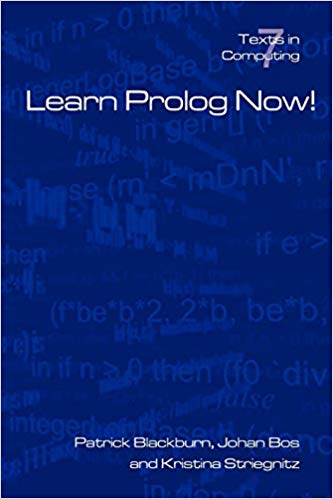
|
FreeComputerBooks.com
Links to Free Computer, Mathematics, Technical Books all over the World
|
|
- Title: Learn Prolog Now!
- Author(s) Patrick Blackburn, Johan Bos, Kristina Striegnitz
- Publisher: College Publications (June 15, 2006); eBook (2012)
- Paperback: 284 pages
- eBook: HTML and PDF
- Language: English
- ISBN-10: 1904987176
- ISBN-13: 978-1904987178
- Share This:

|
Prolog is a programming language, but a rather unusual one. "Prolog" is short for "Programming with Logic", and the link with logic gives Prolog its special character. At the heart of Prolog lies a surprising idea: don't tell the computer what to do. Instead, describe situations of interest, and compute by asking questions. Prolog will logically deduce new facts about the situations and give its deductions back to us as answers.
Why learn Prolog? For a start, its ``say what the problem is, rather than how to solve it'' stance, means that it is a very high level language, good for knowledge rich applications such as artificial intelligence, natural language processing, and the semantic web. So by studying Prolog, you gain insight into how sophisticated tasks can be handled computationally.
Moreover, Prolog requires a different mindset. You have to learn to see problems from a new perspective, declaratively rather than procedurally. Acquiring this mindset, and learning to appreciate the links between logic and programming, makes the study of Prolog both challenging and rewarding. Learn Prolog Now! is a practical introduction to this fascinating language.
The emphasis in this book is on using Prolog effectively. It presents a loose collection of topics that build on and elaborate concepts learned in a first course.
About the AuthorsN/A
- Prolog Programming
- Artificial Intelligence, Machine Learning, and Logic Programming
- LISP Programming Language
- Computer and Programming Languages
 Similar Books:
Similar Books:
-
 The Power of Prolog (Markus Triska)
The Power of Prolog (Markus Triska)
The goal of this book is to bridge the gap between the great traditional Prolog textbooks of the past and the language as it currently is. It is meant to teach Prolog as a practical programming tool and so it concentrates on using Prolog to solve interesting problems.
-
 The Art of Prolog: Advanced Programming Techniques
The Art of Prolog: Advanced Programming Techniques
This book offers a departure from current books that focus on small programming examples requiring additional instruction in order to extend them to full programming projects. It shows how to design and organize moderate to large Prolog programs.
-
 Prolog for Programmers (Feliks Kluznia, et al)
Prolog for Programmers (Feliks Kluznia, et al)
This book is intended as an introduction to Prolog for people familiar with conventional programming languages. It explains in terms of programming constructs and techniques found in Pascal.
-
 Prolog Programming in Depth (Michael A. Covington)
Prolog Programming in Depth (Michael A. Covington)
This book covers the Prolog programming language thoroughly with an emphasis on building practical application software, not just theory. Readers build several types of expert systems, as well as natural language processing software and utilities.
-
 Logic, Programming and Prolog, 2nd Edition (Ulf Nilsson, et al)
Logic, Programming and Prolog, 2nd Edition (Ulf Nilsson, et al)
This book introduces major new developments in a continually evolving field and includes such topics as concurrency and equational and constraint logic programming. What sets this book apart from others on logic programming is the breadth of its coverage.
-
 An Introduction to Logic Programming Through Prolog (J. Spivey)
An Introduction to Logic Programming Through Prolog (J. Spivey)
This is one of the few texts that combines three essential theses in the study of logic programming: logic, programming, and implementation. The book contains a concise and self-contained account of the logic behind Prolog programming.
-
 Prolog Programming: A First Course (Paul Brna)
Prolog Programming: A First Course (Paul Brna)
The course for which these notes are designed is intended for undergraduate students who have some programming experience and may even have written a few programs in Prolog. The emphasis in this book is on using Prolog effectively.
-
 Prolog Experiments in Discrete Math, Logic, and Computability
Prolog Experiments in Discrete Math, Logic, and Computability
This book contains programming experiments that are designed to reinforce the learning of discrete mathematics, logic, and computability. The Prolog programming language is the tool used for the experiments in this book.
-
 Expert Systems in Prolog (Dennis Merritt)
Expert Systems in Prolog (Dennis Merritt)
For Prolog programmer interested in either building expert systems or experimenting with various expert system techniques. using a step-by-step approach to building systems, explaining the concepts and showing the Prolog code at each stage.





